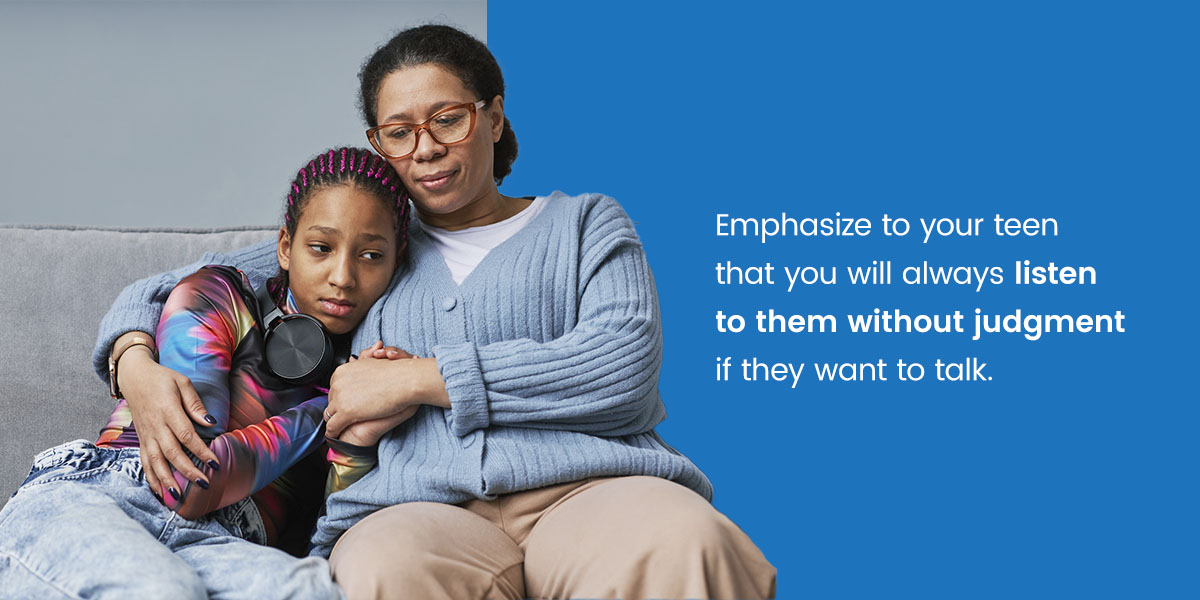
Table of Contents
My Teen Hates Me: A Guide for Parents
As a parent, navigating your child’s teen years can feel overwhelming. The period might be fraught with communication breakdowns, rebellious phases and identity crises. While you may feel as though your teen hates you, this is a common experience many parents face, and it doesn’t always signal the worst.
Teens experience many changes at this time, physically, emotionally and socially. More often than not, they are just trying to figure out who they are and desire space to learn and grow into autonomous individuals. They may struggle to properly communicate or healthily express emotions like stress or anger.
Thankfully, there are several strategies you can use to navigate these sensitive teen years and foster a space for growth and open communication. In this article, we’ll explore the complex dynamics of teenage years and how to build bridges with your teen.
Understanding the Complex Dynamics of Teenage Years
Teens go through several changes in the process of becoming autonomous individuals. Their brains are still developing, and they’re experiencing hormonal changes while struggling for both acceptance and independence. They are acclimating to a new world and don’t always understand their own feelings or how to healthily express them. The teenage years are also a time when they build new platonic or romantic relationships and develop a sense of personal identity.
During this period, you may notice the following behaviors in your teen:
- Argumentativeness
- Moodiness
- Pushes for independence
- Angry or irritable outbursts
- Prioritizing time with friends
- Spending more time alone
- Sleeping more
- Trying out personal styles like new clothing, hair or makeup
- Trying new hobbies or shifting interests
While these behaviors can make it challenging to connect with your teen, changes in family and relationship dynamics are common during these years.
Why It Can Feel Like Your Teen Hates You
It’s helpful to note that if your teen says, “I hate you,” they may just be at a loss for words as they undergo the biological urge for independence. That said, here’s why you might feel like your teenager hates you:
- They’re trying to figure out who they are: At this stage of life, teens desire to define themselves separately from their parents, which is only natural. In order to develop, they may feel like they need to reject their parents, whether by having a conflict with them or trying new hobbies or interests and developing new friendships.
- They want to be taken seriously: While you may feel frustrated by your teen’s outbursts, they may actually feel deeply invested in being taken seriously in what is most important to them at that moment.
- They lack the words to express themselves: Your teen is learning how to properly express themselves during these sensitive years. They may lack the words necessary to explain their new experiences and may find it easier to avoid you rather than trying to figure everything out at once.
- You have unrealistic or unfair expectations: It’s a good idea to evaluate whether your expectations for your child have evolved to suit a teen. Sometimes, your teen may just need more space and might find you overcontrolling. On the other hand, sometimes we go too far in the other direction by not providing enough attention. You’ll want to strike a balance at this stage.
How to Build a Strong Relationship With Your Teen During This Time
Parenting teenagers is an important job. While it may not seem like it, as your child makes the transition from teen to adult, they need you by their side more than ever. Here’s how to promote a healthier relationship dynamic with your teen while letting them learn and grow during this transitional time.
Respect Boundaries
Sometimes, when it feels like your teen wants nothing to do with you, not taking it too personally and providing space is the best thing you can do. It can take time to understand your new dynamics and build trust, but respecting boundaries and being patient can help you develop a healthier relationship. You might do this by:
- Providing space: It’s normal for teens to want space to discover their identity. Give them space to develop their interests and opinions. Get to know your teen by asking them about their opinions on different topics, their friends or their life in general. Be sure to listen to their answers without always giving your opinions.
- Suggesting rather than demanding: Often, teens will do what they want regardless of what you say and may rebel if they feel ordered around. Unless your teen is in harm’s way, try offering advice rather than exerting too much control.
Ultimately, parenting teens is about supporting them while respecting their desire for independence.
Foster Open Communication

Communication is vital when it comes to teenagers and parenting. Emphasize to your teen that you will always listen to them without judgment if they want to talk. While you cannot necessarily stop your child from experiencing mood swings and other challenging emotions during their teen years, you can adjust your communication skills to connect with them. Try these methods:
- Plan the discussion ahead of time.
- Choose a good time and place to chat when your teen is receptive.
- Use active listening.
- Take a break if conflicts arise.
- Avoid yelling back.
- Use humor to diffuse challenging situations.
- Remember how adolescence felt for you and empathize with their struggles.
Offer Positive Reinforcement
Teens often struggle with feelings of acceptance, so try to offer praise when they do a desired behavior, like finishing their homework early or putting plates in the dishwasher. You might also give your child the opportunity to earn things they like in exchange for doing their best at school or completing chores.
Offering positive reinforcement for constructive behaviors can increase the likelihood of your teen engaging in positive and healthy behaviors.
Explore Family Therapy Options
Hearing “I hate you” from your child can feel disheartening and upsetting. There’s something about the word “hate” that brings up strong feelings for parents. While it’s necessary to adjust your expectations during this period of your child’s life, seeking assistance and an outlet for your feelings is also valid.
That’s where family therapy can help — in these sessions, you can work on your relationship dynamics and gain communication tools to build bridges with your teen. You can also process your emotions and reframe experiences with your family, which may help you handle your teen’s outbursts with less frustration.
Building Bridges With Your Teen Through Family Counseling
Most teens feel a sense of confusion during that tricky time between adolescence and adulthood, and many struggle to talk about how they feel. Instead, they may express themselves through moodiness, explosions of anger or anything in between. By promoting open communication, giving them space and fostering a supportive environment, you can build bridges with your teen.
Family counseling can also help immensely during this period of your teen’s life. At Courageous Kids Counseling, our licensed therapists can provide you with the tools to foster healthier relationship dynamics with your teen. We can help uncover the issues that might be impacting your family’s well-being and move you toward a place of peace and happiness.
For family therapy services, schedule an appointment today.



